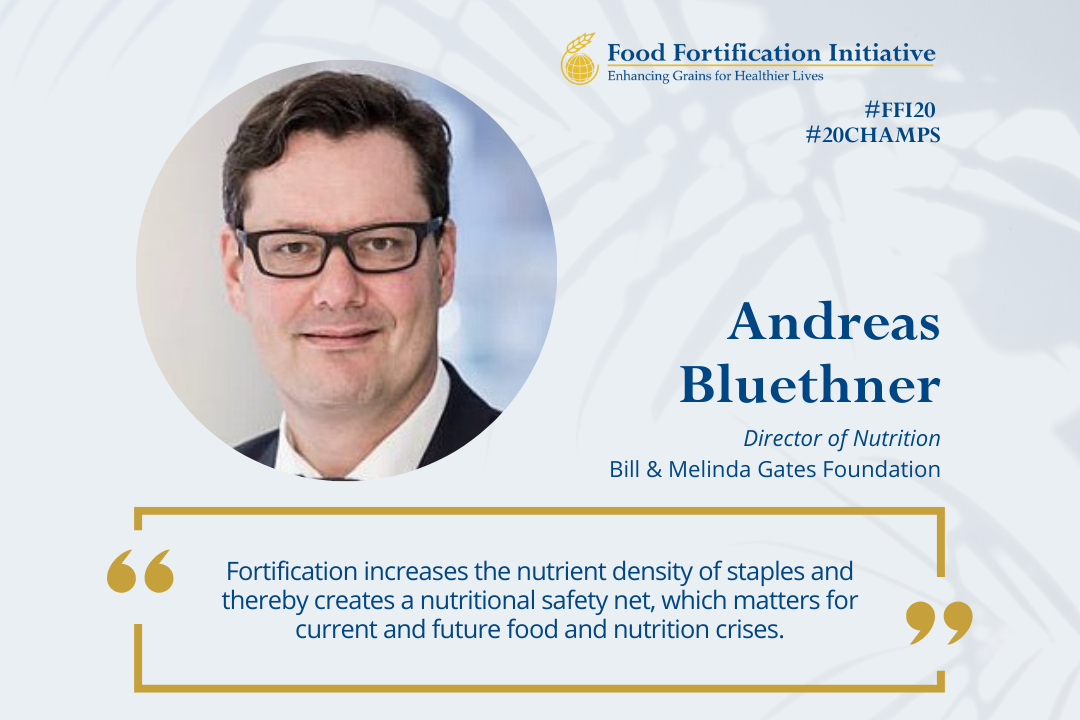Director of Nutrition at Bill and Melinda Gates Foundation

FFI: How did you become interested in nutrition?
Bluethner: I was very active in and committed to sports in my school years, so I learned there that nutrition matters to be the best of yourself and to achieve your goals. During my studies, I was also very concerned with human rights, equity, and development, and specifically the inclusive and participatory social human rights, which includes the right to food and adequate nutrition as the ‘big equalizer’ for societies.
FFI: What inspired you to become involved with food fortification?
Bluethner: Basically, I love nutritious food (laughs). I was always fascinated intellectually by the multi-sector approach of combining the strength of different actors, such as governments re-framing markets, private sector producing quality nutritious foods, and civil society supporting transparency, program delivery, and facilitation of sectors. And with academia ensuring programs are evidence based and deliver on nutritional gaps. In addition, the market-based approach promises to be cost-effective, self-sustaining and scalable—elements not found often in a development intervention.
FFI: How is your organization prioritizing fortification?
Bluethner: Our new nutrition strategy at the foundation puts a new emphasis on food fortification, and we have been one of the most committed donors in the fortification space for close to two decades. But we know very well that there is no single silver bullet in nutrition, but different approaches to improve nutrition for diverse target groups need to come together at the country level. This includes a strong gender perspective in our investments, not limited to maternal, infant, and young child nutrition, since the first 1000 days of human nutrition from conception to two years of age matter for a lifetime.
FFI: What health outcomes do you expect fortification to improve globally?
Bluethner: Our focus of work concerns low- and middle-income countries. My expectation and hope is that we can lead the many fortification programs to improved sustained, relevant coverage that translates into hundreds of thousands of lives impacted with reduced disease burden and improved child survival and development, mentally and physically.
FFI: In your experience, what are the main components to a successful fortification program?
Bluethner: The right data to design the program and the right foods chosen to fortify. High-impact fortification programs that reach target communities are technically feasible when the mills have the capacity to fortify, the right regulations are in place as part of a market framework, and we have public and private sector commitment to implement and monitor quality and compliance.
FFI: What are the greatest challenges you have encountered in planning or implementing fortification programs? And how did you address those challenges?
Bluethner: The greatest challenge so far are ‘free-riding’ producers or importers that label fortification, but in fact save the marginal cost of nutrients added. Purposeful under-fortification and non-compliance denies communities the nutrition they are entitled to, which may put them at disadvantage for a lifetime. This is why we put digital quality assurance, including a public-private partnership (PPP) approach of self- and market monitoring, at the center of our fortification strategy.
FFI: What can we do as a society to continue strengthening fortification efforts?
Bluethner: Increasing the awareness of political and private sector leaders around the ongoing food and nutrition crisis, and that compliance and quality of fortified foods matters most, especially when people spend more on staples due to higher prices and can spend less money on expensive but nutrient-rich diets like vegetables and fruits. Fortification increases the nutrient density of staples and thereby creates a nutritional safety net, which matters for current and future food and nutrition crises.
FFI: If you were not working in nutrition, what do you think you would be doing?
Bluethner: If I would have detoured in my early career after my PhD, I would potentially have chosen some related field that promises to implement human rights and improve equity, such as social and environmental work in the international economic and trading system, and efforts to build more inclusive markets. I’m glad I have chosen something more tangible, and I really love the work on food and nutrition, which is so related to countries’ culture, heritage, and people.
This interview is part of the #FFI20 Champions campaign, a celebration of fortification heroes who have helped build a smarter, stronger, and healthier world by strengthening fortification programs over the past 20 years. To read interviews with other champions, visit the #FFI20 Champions campaign homepage.



